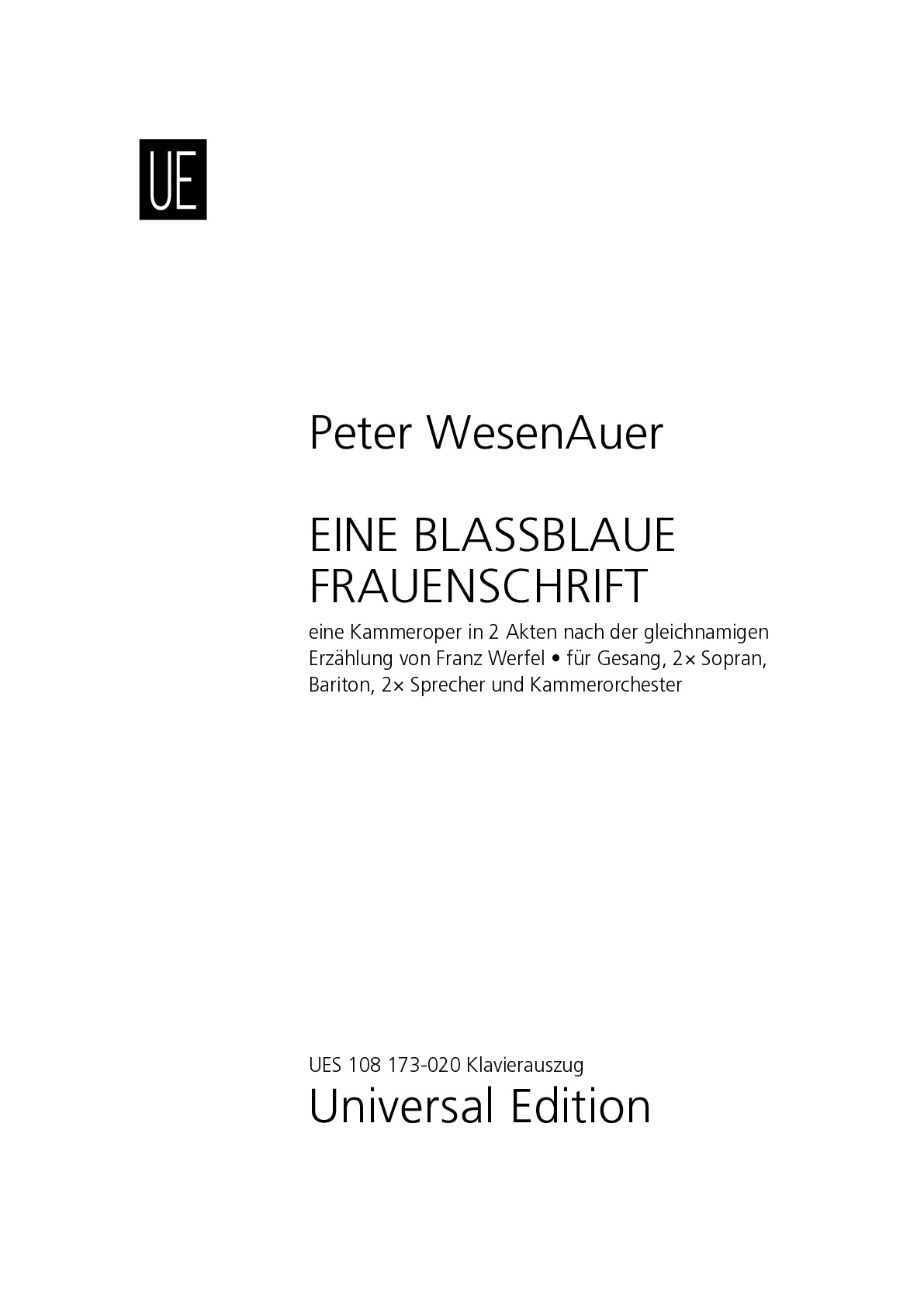

Peter WesenAuer
A FAINT BLUE FEMININE SCRIPT
Short instrumentation: 1 1 1 1 - 0 0 0 0, perc, str
Duration: 120'
Solos:
voice
2× soprano
baritone
2× speaker
Roles:
Leonidas Tachetzi Amelie Tachetzi-Paradini Vera Wormser Richter Verteidiger Chor
Instrumentation details:
flute (+picc, alto fl)
oboe (+c.a)
clarinet in Bb (+bass cl(Bb))
bassoon (+cbsn)
percussion
violin I
violin II
viola
violoncello
double bass
A FAINT BLUE FEMININE SCRIPT
Printed/Digital
Translation, reprints and more

Peter WesenAuer
EINE BLASSBLAUE FRAUENSCHRIFTType: Klavierauszug
Language: Deutsch

Peter WesenAuer
EINE BLASSBLAUE FRAUENSCHRIFTType: Dirigierpartitur
Language: Deutsch
Sample pages
Work introduction
Vienna, October 1936. "Depressions over Austria. Stormy weather impending."
In July, the Chancellor committed through an agreement with the German Reich to include representatives of the national opposition in his government, thereby opening the floodgates to Nazi ideology, including overt aggression against Jews in Austria.
For several months now, Leonidas has held the position of section chief in the Ministry of Culture and Education. His worldview revolves solely around the idea that the "sole purpose of the arrangement of the universe" is to "endow god's favorites like himself with power, honor, splendor, and luxury."
Coming from humble origins, he married the daughter of one of the wealthiest families in the city and has made a successful career. Just a few months after his marriage, he began an affair with Vera Wormser, daughter of a Jewish family in Vienna, during a business trip.
Years later, in October 1936, Leonidas receives a letter in faint blue feminine script, a formal plea from Vera asking him to assist a talented individual who, due to well-known reasons in Germany, cannot continue his gymnasium studies there and wishes to complete them in Vienna.
Time seems to have caught up with Leonidas - the fear of potentially being the father of a son from a Jewish mother terrifies him above all else. He fears "nothing more than the loss of the wealth he enjoys so nonchalantly." He knows that his career owes itself to his acute sense of human vanities, his tact, and "his flexible mimetic art, rooted indeed in the weakness of his character."
Accordingly, he acts: "The matter with Vera" is "finally put to rest."
What is necessary to perform this work?
Leonidas Tachetz (Bass-baritone)
Amelie Tachetzi-Paradini (Soprano)
Vera Wormser (Soprano)
Judge (Actor)
Defender (Actor)
2 Assessor Judges (Actors [silent])
Maid (Actress [silent])
Josef (Child [silent])
Chorus
Flute (doubling Piccolo & Alto Flute in G)
Oboe (doubling English Horn)
Clarinet in Bb (doubling Bass Clarinet in Bb)
Bassoon (doubling Contrabassoon)
Percussion (1 player):
Vibraphone (also played with bow), Xylophone, Glockenspiel, Timpani, Whip, Paper (for tearing), Snare Drum, Suspended Cymbal, 4 Tom Toms, Tubular Bells (C´´, Des´´, D´´, Es´´, G´´), Bamboo Wind Chime, Metal Wind Chime, Sandpaper Blocks, Flexatone, Shekere, Belltree, 4 Temple Blocks, Large Bass Drum, Triangle, Woodblock, Bucket of water, Tam Tam, Wind Chimes, Finger Cymbals
2 Violins
Viola
Cello
Double Bass (5-string)
Strings soloistically arranged
